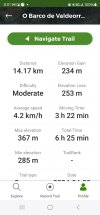JustOneGuy
Active Member
- Time of past OR future Camino
- Aug 2024: GR130, Apr 25: Camino Primitivo?
I was asking myself a question. It may be that with your experience I can come to a more or less reasonable conclusion....
Suppose a stage takes 4 hours, or 6 hours of walking. From that, how long you are actually, on average, between when you leave and when you arrive?
Obviously it depends on the elevation gain, the terrain, your physical fitness, your fatigue, the landscape, the hours of sunshine, the weather, random factors (I want to stop 2 hours to look at the sea, I had a little inconvenience...) etc... But, you know, the roughest estimate is better than nothing (aka "the best is the enemy of the good", Voltaire).
So, on average, does it seem reasonable to you, based on your personal experience, to assume that for a typical route the time spent on the road is for example 1.5 that required by the walk? More? Less?
Example: if the route takes 4 hours from A to B, will it actually take me 6 hours to get to my destination?
Any experience will be infinitely appreciated....
Suppose a stage takes 4 hours, or 6 hours of walking. From that, how long you are actually, on average, between when you leave and when you arrive?
Obviously it depends on the elevation gain, the terrain, your physical fitness, your fatigue, the landscape, the hours of sunshine, the weather, random factors (I want to stop 2 hours to look at the sea, I had a little inconvenience...) etc... But, you know, the roughest estimate is better than nothing (aka "the best is the enemy of the good", Voltaire).
So, on average, does it seem reasonable to you, based on your personal experience, to assume that for a typical route the time spent on the road is for example 1.5 that required by the walk? More? Less?
Example: if the route takes 4 hours from A to B, will it actually take me 6 hours to get to my destination?
Any experience will be infinitely appreciated....




















